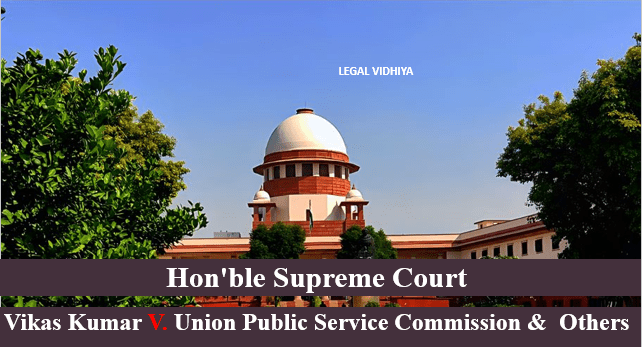
| Citation | [2011] 11 S.C.R. 281 |
| Date of Judgment | 11 February 2021 |
| Court | Supreme Court |
| Case Type | Civil Case |
| Appellant | Vikas Kumar. |
| Respondent | Union Public Service Commission & others |
| Bench | Justice Dr. Dhananjay Chandrachud, Justice Indira Banerjee, Justice Sanjiv Khanna |
FACTS OF THE CASE
The appellant, Vikash Kumar, a civil services aspirant, suffered from a neurological condition called “Dysgraphia,” also known as ‘writer’s cramp’. Accordingly, while applying for the 2017 UPSC exam, he applied under the category of person with locomotor disability and was therefore provided with a scribe for the written test by the UPSC. In 2018, via a notification,
The Department of Personnel and Training (DoPT) issued the CSE 2018 Rules, describing the manner of conducting the examination and providing that only the candidates who fall under the categories of: Blindness, Locomotor Disability, and Cerebral Palsy with a minimum of 40% impairment would be allowed the support of a scribe. While applying for the Civil Services Exam 2018.
The appellant thereby declared himself a person with a disability of more than 40% and requested that UPSC provide a scribe for him during the examination. UPSC rejected his request, stating that he did not fulfil the criteria specified under the CSE Rules 2018.
The applicant was initially declined the disability certificate by the designated authority at Ram Manohar Lohia Hospital, Delhi, which also stated that the disability was less than 6%. After facing disappointment from the Central Administrative Tribunal, which rejected the contentions of the applicant and was upheld by the High Court, the appellant approached the Supreme Court seeking relief. Under the directions of the Supreme Court, a medical examination of the appellant was conducted by AIIMS, which concluded that the appellant did suffer from the said neurological condition; however, his disability did not fall under the category of “Benchmark Disability” as described under the Rights of Persons with Disability Act, 2016.
Issues
The Supreme Court directed the AIIMS to establish a medical board and evaluate the appellant’s condition and provide expert opinion on the following question:
1) Can the appellant be termed a ‘person with a disability under section 2(s) of the Rights of Persons with Disabilities Act, 2016?
2) What is the extent of the appellant’s disability?
3) Does his disability meet the benchmark disability under section 2(r) and section 2(zc) of the act?
ARGUMENTS
The primary arguments of the appellant were that since the appellant has been granted a certificate stating that he suffers from Writer’s Cramp and since the disability is recognised under the Schedule of the RPwD Act, 2016, and now that the Ministry of Social Justice and Empowerment has also recognised the said disability in its notification dated January 14, 2018, the appellant has rights under the given statute. Moreover, it was his contention that the new rules promulgated by the DoPT are in violation of Section 20 of the RPwD Act, 2016, as they
contravene the mandate of providing a reasonable accommodation to the disabled and are not restricted to those with benchmark disabilities only. The applicant also alleged violations of Article 14 and Article 16(1) on the ground that scribes support was provided only to a certain class of persons, i.e., those who suffer
from Blindness, Locomotor disability, and Cerebral palsy, whereas the other benefits are given to all the disabled.
UPSC argument that the governing rules would be those issued by DoPT and that scribes could be provided only to persons falling under the category of “Benchmark Disability”.
The primary argument of the Union was that, as per the new rules, the appellant is not entitled to get the help of a scribe since the writer’s cramp is not specifically stated in the schedule and that it is also not a “Benchmark Disability”. However, since not all medical conditions have been recognised as disabilities, it is for the examination body to decide on a case-by-case basis whether help through scribe and compensatory time should be given to the concerned candidates and whether the requisite of having a disability up to a certain percentage is not mandatory to avail of certain facilities.
JUDGEMENT
The Hon’ble Supreme Court allowed the appeal and set aside the impugned judgment and order of the High Court of Delhi. The appellant was allowed to entail the facility of a scribe to appear for the Civil Services Examination or any other competitive selection examination conducted by the government’s authority. The Ministry of Social Justice and Empowerment was directed to ensure that proper guidelines are framed to regulate and facilitate scribe facilities for persons with disability within three months of receiving the certified copy of this judgment. This has to be done in consultation with the public, specifically with the differently abled and the organizations that represent them.
REFERENCES
• Vikash Kumar vs Union Public Service Commission on 11 February, 2021 (indiankanoon.org)
• SCO Explains: Vikash Kumar v UPSC – Supreme Court Observer (scobserver.in)
• 46.-MANAV.pdf (jlrjs.com)
This article is written by Anuruddha Chauhan of Lloyd Law College, intern at Legal Vidhiya.




0 Comments